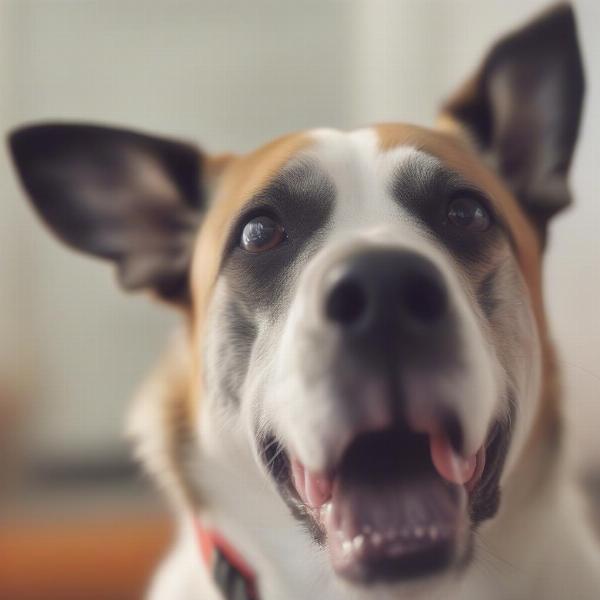Carbon monoxide (CO) is a silent, odorless, and colorless gas that poses a serious threat to both humans and animals. Since dogs have a highly developed sense of smell, many wonder if they can detect carbon monoxide and potentially alert their families to danger. This article will explore the question “can dogs smell carbon monoxide?” and discuss how to protect your furry friend and family from this deadly gas.
Can Dogs Detect Carbon Monoxide?
While dogs possess an incredible sense of smell, significantly more acute than humans, there’s no scientific evidence to suggest they can smell carbon monoxide itself. Like humans, dogs can’t detect the odorless, colorless gas. However, dogs can detect the presence of other gases that may be present alongside CO, such as natural gas or propane, which sometimes contain odorants. This can indirectly alert you to a potential leak. Additionally, dogs are highly sensitive to changes in their environment and their human companions. They may notice and react to symptoms of CO poisoning in their family members, such as dizziness, nausea, or headaches, before humans are even aware of them. This reaction could manifest as unusual whining, pacing, or clinging behavior.
Signs of Carbon Monoxide Poisoning in Dogs
The symptoms of carbon monoxide poisoning in dogs mirror those in humans. These can include:
- Weakness and lethargy
- Vomiting
- Disorientation and stumbling
- Bright red gums
- Difficulty breathing
- Loss of consciousness
If you suspect your dog is suffering from carbon monoxide poisoning, immediately get them and yourself into fresh air and seek veterinary attention.
 Dog Showing Signs of CO Poisoning
Dog Showing Signs of CO Poisoning
Protecting Your Dog from Carbon Monoxide
The best way to protect your dog from carbon monoxide poisoning is to prevent exposure altogether. Install carbon monoxide detectors on every level of your home, especially near sleeping areas. Test them regularly and replace batteries annually. Ensure your furnace and other gas appliances are properly maintained and ventilated. Never leave a car running in a closed garage, even for a short period, as this can quickly fill the space with dangerous levels of CO.
What to Do if Your Carbon Monoxide Detector Goes Off
If your carbon monoxide detector goes off, take it seriously. Immediately evacuate everyone in the house, including your pets, to fresh air. Call your local fire department or emergency services. Do not re-enter the house until it has been deemed safe by authorities.
Can Dogs Be Trained to Detect Carbon Monoxide?
While dogs can’t naturally smell CO, some research suggests that they could potentially be trained to detect it using other cues, like changes in air pressure or the presence of other gases related to incomplete combustion. However, this is not a reliable method for CO detection and should not replace the use of certified carbon monoxide detectors.
Conclusion
While dogs can’t smell carbon monoxide directly, their heightened senses and close bond with humans can indirectly alert us to potential dangers. The key to protecting both you and your canine companion is prevention. Install and maintain carbon monoxide detectors, ensure proper ventilation of gas appliances, and never leave a car running in a closed garage.
FAQ
- Can my dog warn me about a carbon monoxide leak? While dogs cannot smell CO itself, they may notice and react to symptoms of CO poisoning in their owners or other changes in the environment that could indicate a leak.
- What should I do if I think my dog has carbon monoxide poisoning? Immediately get your dog and yourself to fresh air and seek veterinary attention.
- Are carbon monoxide detectors safe for pets? Yes, carbon monoxide detectors are safe for pets. The small amount of radiation they emit is not harmful.
- How often should I test my carbon monoxide detectors? You should test your carbon monoxide detectors at least once a month and replace the batteries annually.
- What are the most common sources of carbon monoxide in the home? Common sources include faulty furnaces, gas stoves, water heaters, fireplaces, and car exhaust.
- Can birds detect carbon monoxide? Birds are actually more susceptible to carbon monoxide poisoning than mammals and can be used as early warning indicators in mines. However, relying on a pet bird to detect CO is not a safe practice.
- How can I prevent carbon monoxide poisoning in my home? Ensure proper ventilation of gas appliances, have regular inspections of your heating system, and install and maintain carbon monoxide detectors.
ILM Dog is your trusted resource for all things dog-related. We offer expert advice on dog breeds, health, training, nutrition, grooming, and much more. Whether you’re a seasoned dog owner or just starting your journey, we’re here to help. For professional guidance on dog care, contact us at [email protected] or call us at +44 20-3965-8624. Visit ILM Dog for a wealth of information and resources to help you provide the best possible care for your beloved canine companion.